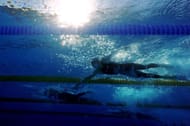Phelps is unquestionably the greatest swimmer of all time. For over two decades, the now-retired American swimmer has won every accolade the sport had to offer. His run at the Olympic games stands in a league of its own with a total tally of 28 medals, including 23 golds. This made him the face of the Olympics and he remains the face of the games long after his retirement.
To think that his legacy post-2008 could have come to a halt after a swimsuit controversy is rather surprising, but this is exactly what almost took place! In 2009, Phelps faced his first defeat in five years when German swimmer Paul Biedermann beat Phelps in the 200-meter freestyle.
The hot topic after the race was not that Phelps had lost, rather, it was about the swimsuit the German wore at the event! The issue seemed rather docile, but things took a turn when Phelps announced that he would stop swimming internationally!

Michael Phelps' Threat
Going into the 2009 Long Course World Championships, Michael Phelps held the world record for the 200-meter freestyle with a time of 1:42.96 that he had set the previous year at the Beijing Olympics.
The 200-meter freestyle heats at the 2009 Worlds saw Biedermann finish first, ahead of Phelps, who was on his tail throughout the race. Although Biedermann once again bested Phelps in the semi-finals, everyone expected Phelps to turn on the burners in the finals and clinch first place.
However, Biedermann beat Phelps and set a new world record in doing so with a time of 1:42.00, which was 1.22 seconds faster than Phelps's second-place finish.

Everyone was left stunned, but the media quickly picked up on the differently styled suit used by Biedermann, a 100% full-bodied polyurethane Arena swimsuit. Bob Bowman, Phelps' coach, speaking to the media after the competition said:
"The mess needs to be stopped right now ... My recommendation to him [Phelps] is not to swim internationally until this is resolved."
After Bowman's monologue, Phelps backed his coach and announced that he may not be swimming internationally until the 'super-suits' are banned by FINA. He said:
"He [Bowman] chooses what's right for me and what's right for my training, That's his decision."

The German swimmer's victory was a bittersweet one as he was rapidly confronted by the media right after his victory, unfortunately not being given enough time to enjoy the moment. Biedermann, however, replied diplomatically to the media's prompts. He said:
"The suits make a difference of course. I think we're in a dangerous situation with what comes next. It's really important to go back to the real swimming. I hope there will be a time I can beat Michael Phelps without the suit of course and I hope that it could be next year or the next two years, but I also think it's not all about the suit."

The Super-Suits
The issue with the super-suits arises when we look at the science behind swimming. Drag is a phenomenon in fluid dynamics that occurs when a body is slowed down by friction caused by the fluid. Swimmers aim to reduce this effect as much as possible by wearing tight swimwear such as the uncomfortable tight caps.
The supersuits are made of thin material, with tiny pockets of gas trapped within. The gas acts as a barrier between the swimmer's body and the water, significantly reducing the effect of the drag.
In 2010, the suits were banned by all major swimming organizations, including FINA, and Phelps did not go through with his threat!
